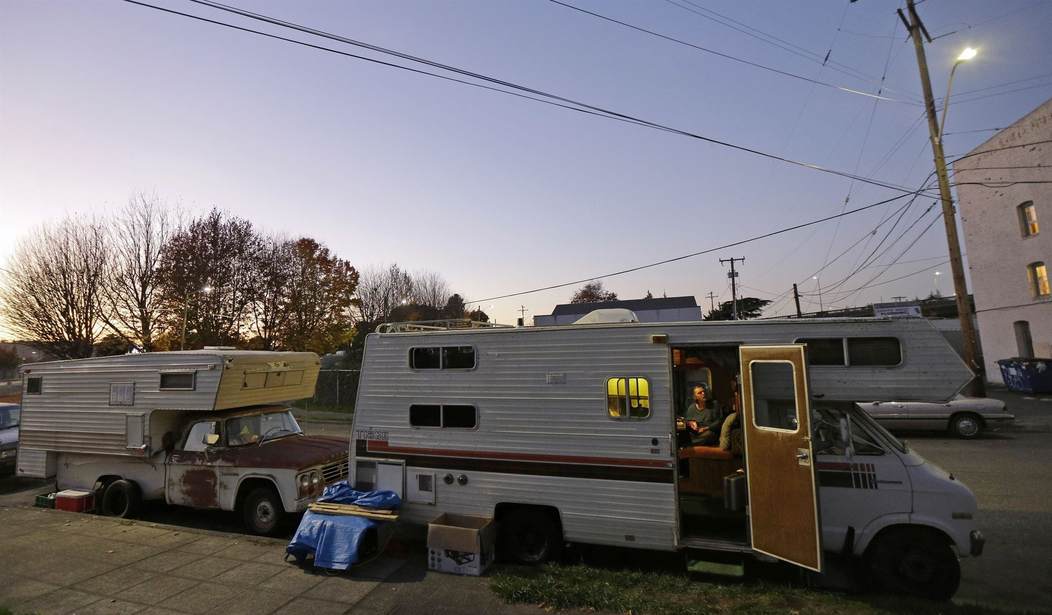Seattle residents and business owners are fed up with the homeless camps and RVs who set up along city streets and remain until the city gets around to moving them somewhere else. So now they are fighting back by dropping 1-ton concrete blocks, called “eco” blocks along roadways.
These days, a significant portion of public parking in Georgetown has been blocked by large chunks of concrete, between 3 and 6 feet long. The blocks, which are sometimes referred to as “ecology” or “eco” blocks, have been placed anonymously and illegally by people hoping to prevent RVs from parking in front of their homes or business.
Large vehicles cannot park overnight in Seattle unless they are in areas zoned for industrial use, concentrating RV dwellers in a few neighborhoods. Ecology blocks have followed, quietly increasing the last two years in neighborhoods like Georgetown, Ballard and Sodo as the city of Seattle suspended parking enforcement during the pandemic…
It is illegal to place ecology blocks in public streets, sidewalks or parking spaces. Ecology blocks cause “parking spillover into adjacent streets, block utility access and cause other accessibility or transportation problems,” according to the Seattle Department of Transportation…
The city says the main challenge of responding to complaints about illegal ecology blocks has been identifying who is responsible for them. Because the blocks are placed on public streets, sometimes in the vicinity of multiple properties, it is not always clear who paid for them.
One of the business owners who said he approves of the blocks said that people who criticize their use probably haven’t had to deal with homeless camps up close and personal the way he has for several years.
Over the last 10 years, but especially during the pandemic, [JW] Harvey said he has spent more time providing water and tools and speaking with the people living on the streets next to his property than he has running his business.
Harvey said he does not want to place ecology blocks around his property because they look bad and take up public parking. However, he’s growing tired of trying to manage the “ripple effects” of the homeless population in his neighborhood.
What often happens is that the city will move out a camp or a set of RVs and clean up the area but within days some of the campers return and start all over again. Radio host Jason Rantz described the eco-blocks as a sign of desperation from residents.
The eco-blocks wouldn’t go up if the Democrat leaders had a coherent strategy to tackle homelessness. Imagine how desperate one must feel in order to anonymously place the concrete barriers. It’s done because they know they have to protect their own communities; Democrats here won’t prioritize taxpayers over the homeless.
For all the years where a holistic plan was promised, all while sinking billions in efforts to solve homelessness, the region has little to show for it.
One reason nothing gets done is that the only solution Councilmembers and area activists will accept is a fully subsidized studio apartment on Capitol Hill for every homeless person. There will be no rules and no expectation to stop smoking fentanyl or seeking treatment for a mental health problem. In other words, constantly enabling the very behavior that caused the homelessness to begin with, only this time, we’ll take care of them until their inevitable overdose.
Want to get rid of the eco-blocks? Put teeth to a homelessness plan.
By teeth he means drawing some lines about how long homeless people with drug, alcohol or mental problems are allowed to stay on the street and refuse the help they need. And that also might mean cracking down on the petty theft many of the homeless use to fund their habits. So long as the same people can cycle through the system dozens of times without consequences people are going to continue to resort to desperate and illegal measures like eco-blocks.
Update: The mayor spoke about this yesterday.
“I’m out there talking to small business and talking to homeless advocates about that issue (and) we do want them removed,” he said. “We will monitor and regulate and again we have SDOT working feverishly on this issue.”…
“What we will say under our administration they see we are trying to make areas safe, healthy and clean (and) we are trying to house people,” Harrell said. “So our strategy just can’t be focused on one issue, it’s a whole ecosystem around there and we are on our job so we understand it, but eco blocks are just not the way either. We are looking for a fair, constitutional approach to our public’s safety and health and that’s what we are going to do. But eco-blocks are just not the way either.”
People don’t want a “whole ecosystem” living in front of their home or business. Because usually that ecosystem means more trash, crime, fires, violence, drugs, dumping of human waste, etc. Seattle has allowed this free-for-all to persist, now business owners have decided to play by the same rules.








Join the conversation as a VIP Member